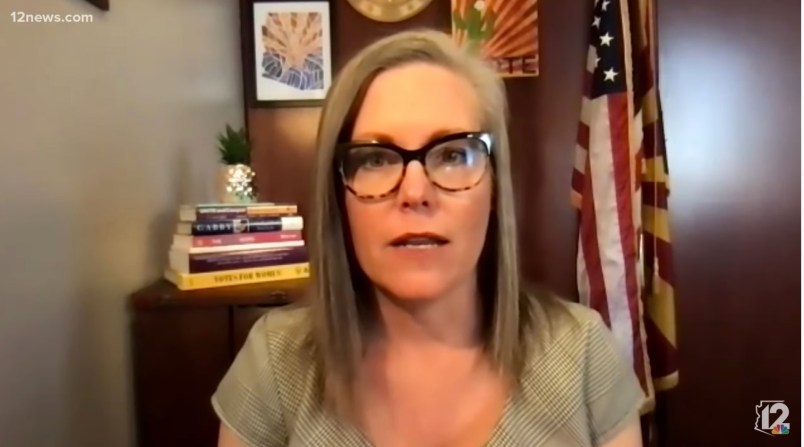Arizona Republicans are looking to put an end to the state’s top election official’s ability to defend election laws in court. Recently added language to the state’s budget package, which could be passed by the legislature as soon as this week, deprives Democratic Secretary of State Katie Hobbs of any role in elections-related litigation. The bill rests that authority solely with the state’s attorney general, who currently is a Republican, Mark Brnovich.
But there’s a catch. The measure sunsets in Jan. 2023 — presumably because, come the 2022 election, the attorney general could be a Democrat. Or, perhaps, the secretary of state could be a Republican.
That provision is just one example of how the refusal to come to terms with President Trump’s loss has empowered fringe actors to cast doubt on the 2020 election, while making Secretary Katie Hobbs a villain to the far-right.
The budget language seems in part aimed at how Hobbs sided against restrictive state voter laws that are before the U.S. Supreme Court this term. But the bill also targets how she brought in outside counsel to help her defend Arizona’s 2020 election results against the wacky lawsuits brought by Trump’s allies amid his election reversal crusade. The budget bill blocks her office from spending on outside counsel, though she can hire “one” full-time official to her office to serve internally as her legal advisor, under the legislation. The attorney general is also, under the bill, banned from representing Hobbs in court or giving her legal advice — in another provision that expires specifically in 2023.
Hobbs, in a statement on the legislation, said that “while other state officials remained silent, we defended the election in countless lawsuits seeking to overturn the will of Arizona voters.”
“The fact that the legislature has singled out me and my office for these unjustifiable restrictions — restrictions which would expire at the end of my term — make it clear what this is really about: partisan politics,” she said.
She also connected the bill to the sketchy Senate-ordered audit underway to recount Maricopa’s 2.1 million ballots and how the legislature had worked “all year” to “undermine our elections.
“It appears their next step is an attempt to undermine Arizona’s Chief Election Officer,” she said.
Hobbs has emerged as a prominent critic of the audit. She most recently urged Maricopa County officials to not reuse the election equipment that had been turned over to auditors because of security concerns stemming from how the auditors handled the machines.
But chaos of the audit has not humbled the state GOP lawmakers who ordered it. They’re now in a mad dash to pass several elections-related measures, in addition to the budget language aimed at Hobbs, that appear to have been shaped by the conspiracy theories around Trump’s 2020 defeat.
Earlier in the session, lawmakers passed a bill that will undermine the state’s practice of letting voters put themselves permanently on a list to automatically receive mail ballots. They have also banned private funding of election administration.
In recent days, several other elections bills have picked up steam, as part of the horse-trading that is happening to get a budget passed, according to Alex Gulotta, the Arizona state director of the voting rights group All Voting Is Local.
“There are a small minority of people that are trying to deliver voter restriction bills,” he said. That’s led to election measures being unveiled and advanced at the last minute, during the budget negotiating process.
One such measure is an amendment, added to another election bill, that creates a criminal referral process around ballot signature mismatch. If a signature doesn’t match on a mail ballot, and the voter doesn’t fix the issue in the 5-day curing period that the state provides, then a copy of the ballot, as well as other information about the voter, is sent to the county or state prosecutors for investigation, under the legislation.
The underlying bill that provision was added to was already attracting criticism. It makes a whole host of changes to election procedures that critics say are, at best, unnecessary and rooted in false beliefs about the 2020 election, while creating extra administrative burdens for election officials.
One such change — requiring that voters be given receipts if they ask for one showing information about where the ballot will be counted — is causing particular concern. Since ballot tabulation machines don’t currently print such receipts, the legislation allows handwritten receipts as well. Voter advocates fear that the requirement will create choke points at voting sites, and cause lines and delays at polling places.
Another bill voter advocates were closely watching would have created new ID requirements for mail ballots. It failed, somewhat surprisingly, in a vote on floor Wednesday.



